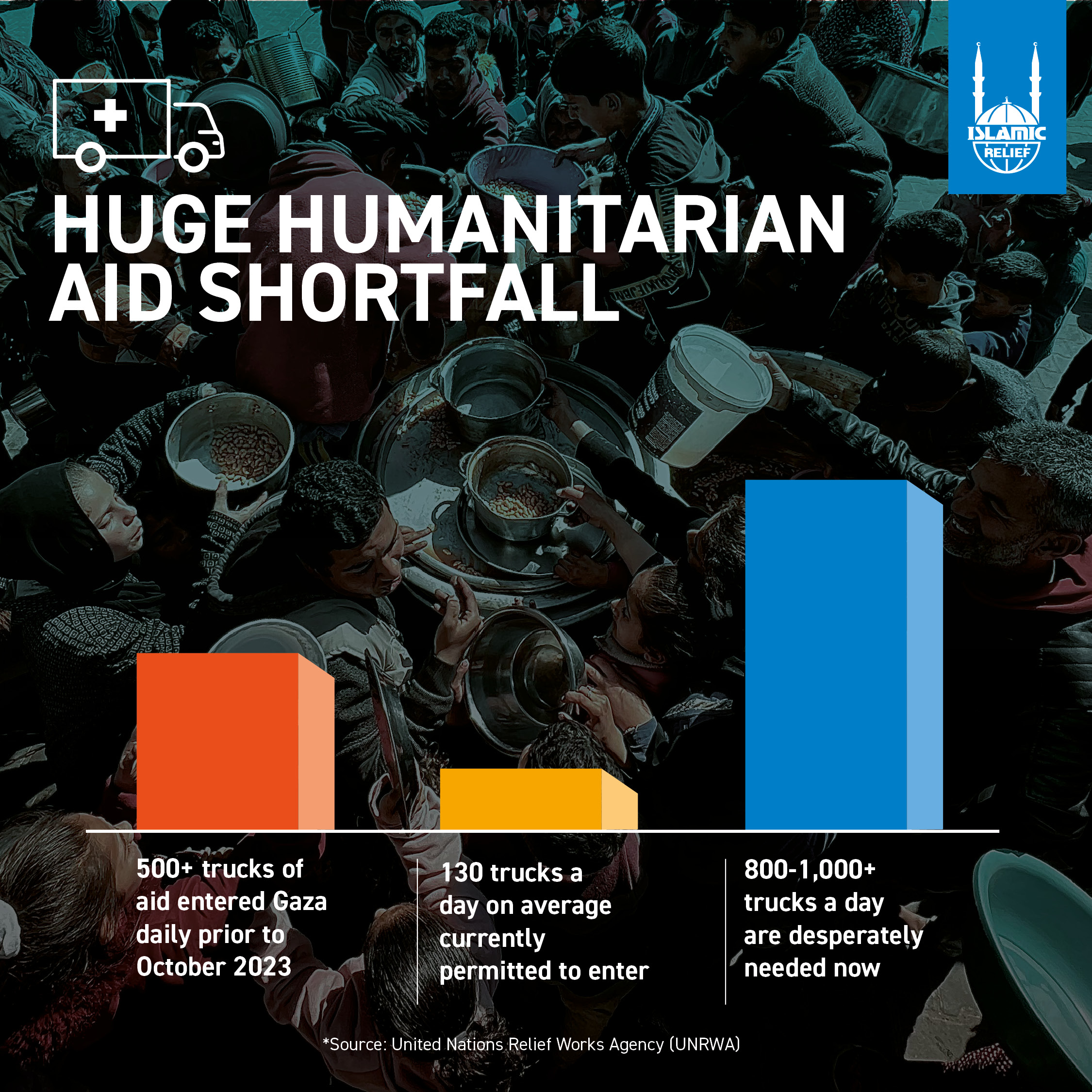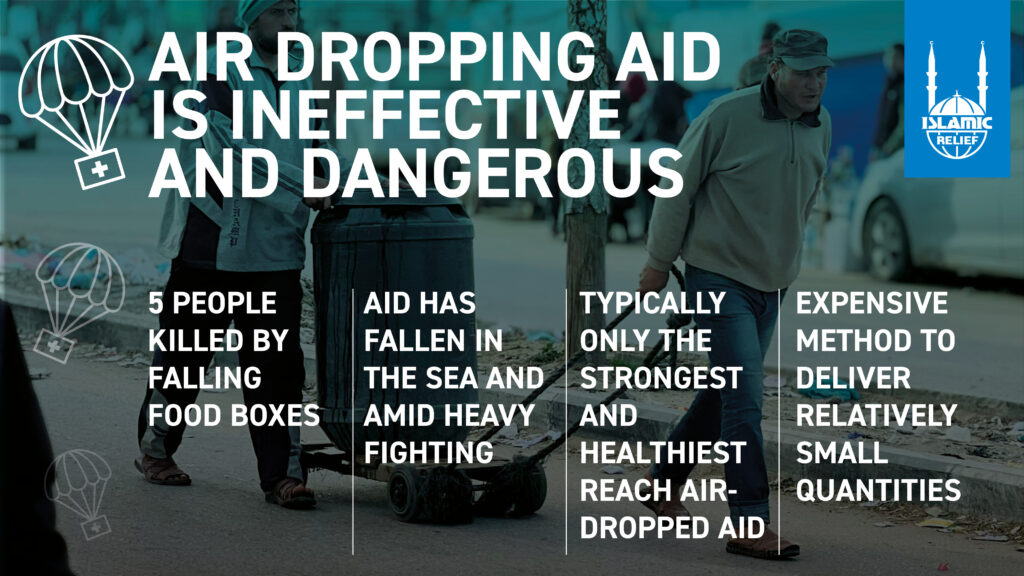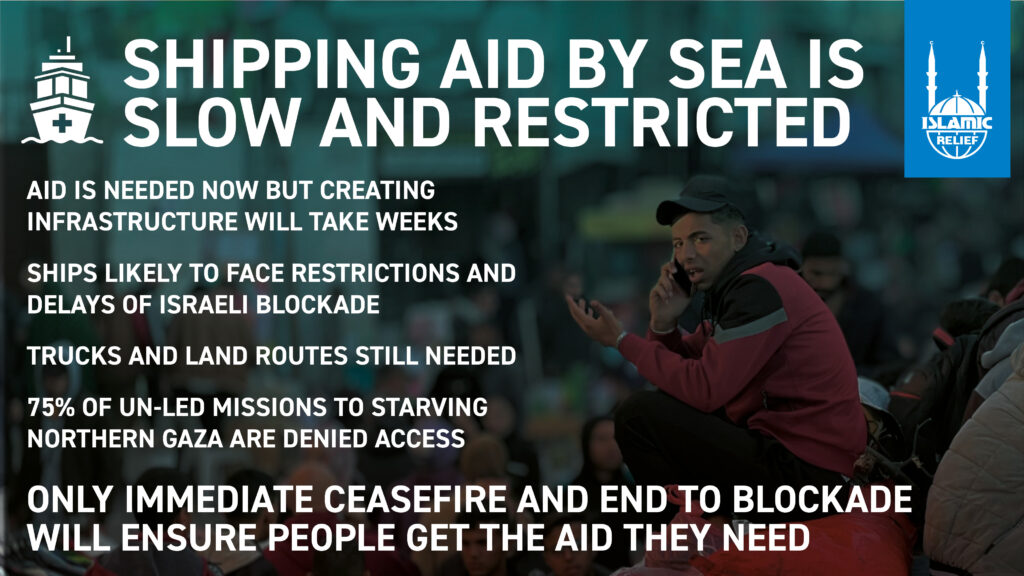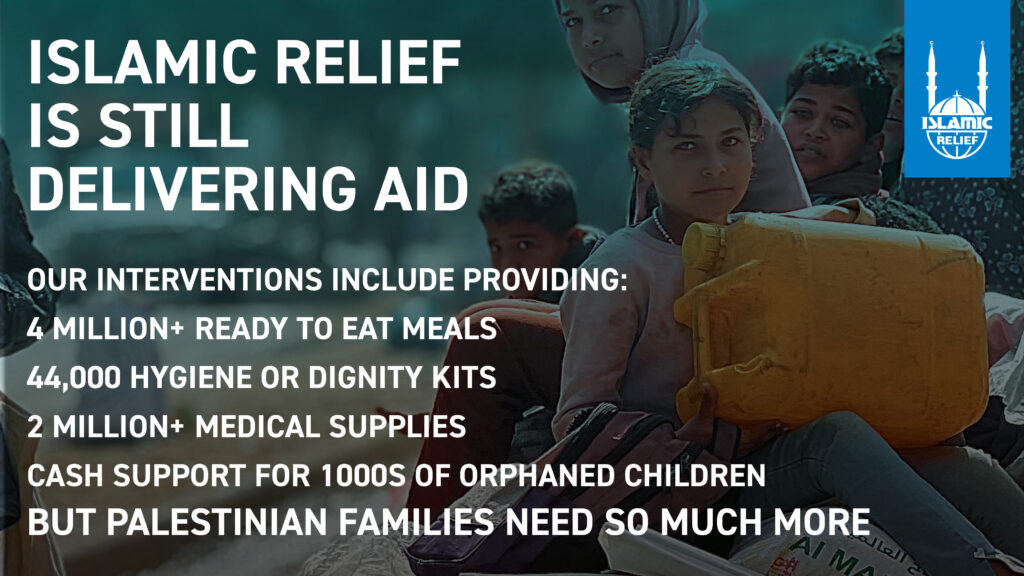Children are dying of starvation in Gaza and famine is looming. We spoke to Alun McDonald, Islamic Relief’s head of media and external relations, about some of the challenges of getting enough aid into Gaza, and why proposed air and sea routes are no alternative to getting aid in by land.

What sort of aid is needed in Gaza?
The humanitarian crisis in Gaza is the worst in the world, with children and older people now starving to death and others eating grass or leaves to try to survive. Time is running out to prevent a massive and entirely man-made famine. We urgently need to get a wide range of lifesaving aid including food, medicine and hygiene items into Gaza.
What are the challenges getting aid into Gaza at the moment?
People desperately need more aid, but the 2 biggest challenges are the Israeli blockade and the absence of a ceasefire.
Israel controls everything coming into Gaza through the 2 crossings that are currently open for aid trucks (Rafah and Kerem Shalom, also known as Karem Abu Salem).
There are lines of aid trucks waiting for Israeli permission to enter, and vital aid including cancer medicine, anaesthetics and water filters have been denied entry. The UN reported that small scissors have even been confiscated from children’s medical kits.
Even before the current escalation at least 500 trucks a day entered Gaza – now the needs are massively increased and a bare minimum of at least 800-1,000 trucks a day are needed. But in the last month only around 130 trucks a day have got through on average.
Even when aid does get into Gaza, it is extremely dangerous and difficult to deliver it amidst ongoing attacks, bombing and damaged roads.
In the past couple of weeks hundreds of desperate civilians have been killed while queueing up to get food aid for their hungry children.
Gaza is now the most dangerous place in the world to deliver aid, with hundreds of humanitarian workers and health staff killed and aid convoys attacked.

Several governments are now flying aid and dropping it from the air. Does that help?
Air dropping aid is usually only a last resort as it’s the least effective method.
We’ve seen in recent days that it can even be deadly, with 5 people killed by falling food boxes.
When you’re dropping aid from great heights, it’s hard to control where it goes or who gets it. In Gaza some of the aid has fallen into the sea and some into extremely dangerous areas with heavy fighting.
When humanitarian agencies distribute aid on the ground, we take steps to ensure that it reaches the most vulnerable groups – such as older people, people with disabilities, and orphaned children. We can ensure that women are prioritised too. But when it’s dropped from the air it’s much harder to manage and it’s often the strongest and healthiest men who reach the aid first.
It’s also a very expensive way to deliver relatively small quantities – an air drop generally provides just a fraction of the aid that can be delivered by a truck convoy.

What about the new announcements of bringing aid in by sea?
There are efforts to open a maritime corridor from Cyprus, but it will have very limited impact without a ceasefire and an end to the blockade. There are several challenges…
First, the logistics. We are racing against time to save lives, but it’s likely to take weeks to set up the necessary infrastructure for sea access, such as a floating port. Meanwhile, trucks are already queuing up ready to enter as soon as allowed.
Dozens of ships a day will be needed. So far one ship with 200 tonnes of aid has set off – that’s reportedly equivalent to about 15 trucks, when we need at least 800 trucks a day. The amount of aid likely to come by sea is literally a drop in the ocean compared to what’s needed.
Second, the blockade. Israel will still screen all the aid coming in via sea, meaning it’s likely to face the same restrictions and delays that are currently seen at the existing crossings.
And third – even if aid does get to Gaza via the sea, it will then still have to be delivered by trucks on land. Without a ceasefire, these land routes are still extremely dangerous and heavily restricted. Over the last month the UN says at least 75% of UN-led missions to northern Gaza – where starvation is highest – have been refused access by the Israeli military.

How is Islamic Relief getting aid in?
We are working with UN agencies such as the World Food Programme, who are bringing in some food via the Kerem Shalom crossing which we then distribute. We’ve also managed to bring in some blankets and hygiene kits through the Rafah crossing, and we are constantly trying to get more in.
Despite the huge challenges, our team in Gaza and our local partners are delivering aid every day. So far we’ve cooked over 4 million ready-to-eat meals for displaced families in the overcrowded shelters, and distributed aid such as 44,000 hygiene or dignity kits that include things like soap, nappies for infants and menstrual hygiene items for women and girls.
But it’s nowhere near enough and we desperately need more aid to get into Gaza.

What needs to happen?
Only a ceasefire and an end to Israel’s blockade can ensure that enough aid reaches people and address the enormous humanitarian catastrophe.
More aid is urgently needed, but the sea and air initiatives won’t be enough and can’t be a substitute for getting more aid in by land, which is by far the most effective route. We need more aid to enter through the 2 current crossings, and the other crossings such as Erez/Beit Hanoun and Karni to be reopened to aid supplies. Commercial goods must be allowed in as well as aid, to restock Gaza’s depleted markets.
We want international governments to demand an immediate and lasting ceasefire and do everything they can to pressure Israel to allow full unimpeded humanitarian access, as obligated under international law.
How can I help?
For many people in Gaza, the aid that’s getting in is their only lifeline. This Ramadan please support Islamic Relief’s lifesaving work and donate your zakat and sadaqah.
But humanitarian aid alone is not enough and people in Gaza urgently need political action. Please keep writing to your political representatives and call on them to demand an immediate ceasefire and end to Israel’s siege.
Please help Islamic Relief support people in desperate need in Gaza: Donate to our Palestine Emergency Appeal now.










